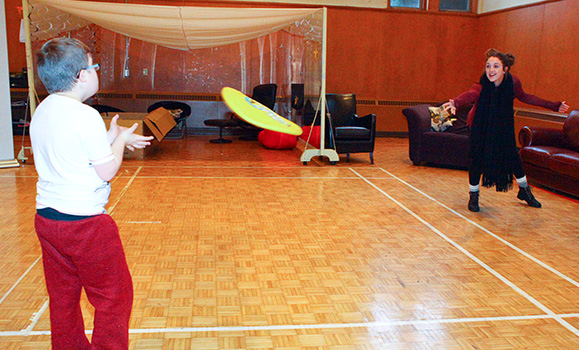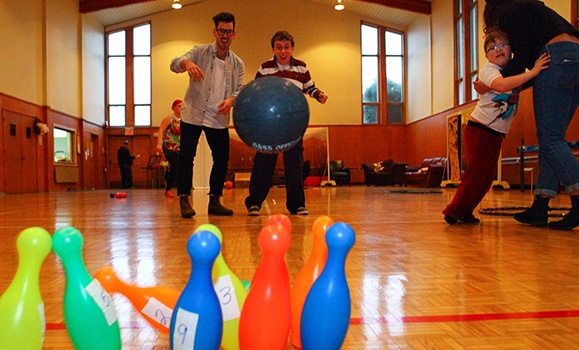Sara Densmore and Brenden Butchart have discovered that the more they give of themselves, the more they receive in return.
Sara and Brenden are two of several Therapeutic Recreation students who volunteer at SCRI Society: The Club, a United Way-funded social and recreational program for persons with varied abilities. Both found out about it when Club founder and executive director Alice Evans, whose son Alfie is a participant, made a presentation at the Therapeutic Recreation orientation getaway at Camp Mush-A-Mush.
Getting active, getting creative and simply getting to know participants at The Club has given Sara and Brenden the chance to put their learning into practice. But more importantly, itās allowed them to learn more about themselves.
āIād never worked with people with varied abilities before, so coming here was a big eye-opener. I realized that Iām passionate about working with this population,ā says Sara, whoās now a session leader with more organizational responsibility in her second year of volunteering at The Club.
āAll of our courses are directly related to whatās happening here. We get to go to school, learn about this stuff and then literally apply it at The Club.ā
Brenden began volunteering in September. Like Sara, his experience at The Club has been both novel and illuminating.
āItās a whole other side of well-being and care and itās helped me discover myself and where I want to be in the helping professions,ā Brenden says. āThe Club is a great example of encouraging peopleās leisure and pushing peopleās boundaries and getting people to explore themselves.
āThatās what recreational therapy is.ā

Dal student Sara Densmore plays frisbee with Alfie McCarthy.
Laughter, friendship and freedom
As for what happens at The Club, itās a mixture of organized and free activities. The Club features scheduled programs focusing on music, theatre, food and physical activity, but also holds drop-in sessions six days a week.
Brenden, speaking at the beginning of one drop-in gathering, says these sessions usually begin with volunteers and participants collaborating on the making of a healthy snack. Depending on the day, the snack might be followed by a walk outdoors, arts and crafts or free play in The Clubās gymnasium.
āWe just hang out and get to know each other,ā says Brenden. āWe laugh a lot. Itās such a great space to be able to just be yourself and do whatever you feel like doing.ā
As Sara notes, having a fun and safe space to be oneself is something especially valuable for people who encounter limited access to and inclusion in activities elsewhere in society.
āThis is a place where people can come and be normal with everyone, because we all act ourselves here. And āourselvesā can be wild and crazy here, because everyone accepts that.
āBasically, we do everything here that you would do with the friends in your life.ā
According to Alice Evans, the friendship of Dal students like Sara and Brenden has helped create a family feeling at The Club.
āDal students make The Club and theyāre part of the Club family,ā she says. āThey donate so much more than just their hours and itās a great example of the university benefitting the community.ā
Finding inspiration
Sara and Brenden, meanwhile, say they benefit as much or more than anyone.
āEveryone Iāve met at the Club has just been so inspirational to me,ā says Sara. āItās been life-changing to take a break from my world and seeing things from their point of view.ā
As Brenden puts it, his time at The Club sets the tone for his life outside of it.
āWhenever I leave the Club, I have a smile on my face. Iām elated, Iām on a high and I feel like Iāve done something to make a difference.
āI carry that feeling with me the whole week until I come back.ā

